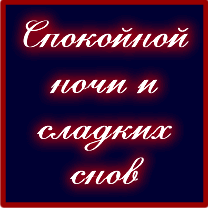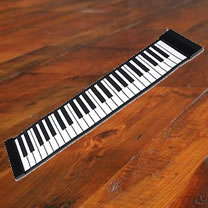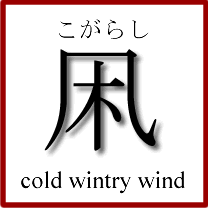
Here’s a recording in a mystery language.
Can you identify the language, and do you know where it’s spoken?

Here’s a recording in a mystery language.
Can you identify the language, and do you know where it’s spoken?

The most common way to say good night in Russian is спокойной ночи (spakóynay nóchi). Which is a contraction of the phrase Желаю тебе спокойной ночи (I wish you a quiet night).
Спокойной is a form of спокойный, which means ‘calm, gentle, pacific, secure, sober, collected, cool, level, quiet, settled, tranquil, cosh, comfortable, immovable, peaceful, sedate, steady, reposeful, cool-headed, orderly, restful, smooth, unruffled, sober-blooded, composed, imperturbable, placid, serene, still, douce’.
Related expressions include:
– спокойная жизнь = a restful life
– спокойная вода = calm water
– спокойное море = serene
– спокойные цвета = quiet colours
– спокойный нрав = even temper
– спокойствие духа = peace of mind
Ночи is a form of ночь, which means night.
Related expressions include:
– ночной столик = bed-side table
– ночной сторож = watchman
– ночной цветок = night-flower
Other ways to wish someone a good night in Russian include:
– Доброй ночи = Good night
– Сладких снов = Sweet dreams
– Приятных снов = Pleasant dreams
Сладких is a form of сладкий, which means ‘honeyed, sweet, luscious, mellow’.
Снов is a form of сон, which means ‘sleep, dream, slumber, rest, repose, shut-eye’.
Приятных is a form of приятный, which means ‘acceptable, sweet-tempered, goodly, likable, palatable, soft, kindly, good, grateful, lovesome, pleasing, satisfactory’.
Are there other ways to wish someone a good night in Russian?
I came across an interesting article today about a possible link between synesthesia and language learning.
The article reports a survey of students in Prague and British Columbia which found that those who learn a language or languages after reaching school age are somewhat more likely to have synesthesia than those who are bilingual from birth or a very early age.
The article speculates that synesthesia might be a learning aid that is particularly useful for people learning “opaque” languages. That is languages with complex spelling systems, like English, and not so useful for “transparent” languages like Czech, where the links between spelling and pronunciation are much more straightforward.
The English orthography is described as “a hot mess of weird rules, exceptions, and exceptions to the exceptions”.
Do you think this is a fair description?
Do any of you have synesthesia?
If so, does it help with learning languages?

The Welsh word llawr [ɬau̯r] means floor, deck, gallery, stage, platform, cellar, basement, ground, face, and a few other things. I discovered today that it has cognates in all the other Celtic languages:
– leur (Cornish) = floor, ground
– leur (Breton) = area, ground, floor, soil
– lár (Irish) = ground, floor, middle, centre
– làr (Scottish Gaelic) = floor, ground, storey
– laare (Manx) = storey, deck, floor, bottom, flat, set, sill, level
These words all come from the Proto-Celtic *ɸlārom (floor), which comes from the Proto-Indo-European *pleh₂rom or *ploh₂rom, from *pleh₂- (to be flat).
THe PIE word *pleh₂- is the root of many other words, including:
– The English piano, plain, plan, floor and flake
– The Dutch vloer (floor, ground, surface)
– The German Flur (hall, hallway, corridor, stairwell)
– The Italian piano (flat, level, smooth, plane, softly, quietly)
– The Spanish llano (even, flat, level, plain) and plano (plain, level, flat)
– The Latvian: plats, plašs (wide, broad)
– The Lithuanian: platus (wide, broas)
– The Russian плоский (flat, plain, level)
Sources: Wiktionary, Geiriadur Prifysgol Cymru, Maga Cornish Dictionary / Gerlyver Kernewek, Dictionnaires bilingues de Francis Favereau, teanglann.ie, Am Faclair Beag, On-Line Manx Dictionary, Reverso

Here’s a recording in a mystery language.
Can you identify the language, and do you know where it’s spoken?

I learnt an interesting Japanese word and kanji today – 凩 (こがらし / kogarashi), which means ‘cold wintry wind’ or ‘the cold wind that reminds us winter is coming’. It is also written 木枯し or 木枯, and is considered ‘untranslatable‘ by some.
The character 凩 is a 国字 (こくじ / kokuji), that is one that was made in Japan rather than being borrowed from Chinese. It combines 几 (ki – armrest, desk, table, screen), which can also mean ‘to envelope; to wrap around’, with 木 (ki / moku – tree, shrub, bush, wood).
Other kokuji include:
– 凧 (いかのぼり; たこ – ikanobori; tako) = kite
– 凪 (なぎ; な.ぐ / nagi; nagu) = lull; calm
– 働く (はたらく / hataraku) = work
– 峠 (とうげ / tōge) = mountain peak; mountain pass; climax; crest
– 杢 (モク / moku) = woodworker
– 杣 (そま / soma) = timber; lumber; woodcutter
In Welsh there is a word that is similar to 凩: rhewynt, meaning an ‘ice-cold wind’, from rhew (frost, ice) and gwynt (wind, breath). There are also a number of other interesting wind-related expressions:
– gwynt carthen = breeze created by shaking a blanket (said comtemptuously of a preacher’s artificial eloquence)
– gwynt coch Amwythig = the east wind (“the red / sorching wind of Shrewsbury”)
– gwynt y creigiau = north-west wind (“wind of the [Snowdonian] rocks”)
– gwynt ffroen yr ych = the east wind (“the wind the ox’s nostril”)
– gwynt pilyn = breeze created by shaking a sack in order to separate the chaff from the grain when wwinnowing (“wind of a garment”)
– gwynt traed y meirw = the east wind (“the wind of dead men’s feet” – refers to the custom of burying people with their feet to the east)
Sources: http://www.sljfaq.org/afaq/kokuji-list.html, Geiriadur yr Academi, Geiriadur Prifysgol Cymru
Are there equivalents of 凩 (kogarashi) in other languages?
Or other interesting wind-related expressions?

I discovered last night that in French a cog is a une dent, which also means a tooth, or une dent d’engrenage (“tooth gear”), and a cog wheel is une roue dentée (a toothed wheel), which is kind of a cog looks like.
The English word cog, meaning a tooth on a gear, or a gear or a cogwheel, comes from the Middle English cogge, from the Old Norse kugg (notch), from the Proto-Germanic *kuggō (cog, notch), from the Proto-Indo-European *gugā (hump, ball), from *gēu- (to bend, arch).
A cog can also refer to an unimportant individual in a greater system, e.g. He’s just a cog in the machine, which in French would be Il n’est pas qu’un rouage de la machine – rouage is another word for cog or gearwheel, and also means part. Les rouages means machinery, as in les rouages de l’État (the machinery of state) or les rouages de l’administration (the wheels of government).
In German a cog is Zahn (tooth) and a cogwheel is Zahnrad (toothwheel). He is only a cog in a machine is Er ist nur ein Rädchen im Getriebe (“He is only a little wheel in the works/gears/gearbox”), or Er ist nur eine Nummer unter vielen (“He is only a number among many”).
Are there similar expressions in other languages about being a cog in a machine?
Sources: Reverso, Wiktionary, WordReference.com and giantbomb.com

Last week I went to the Polyglot Pub in London. I’ve been to similar events in Manchester and Liverpool, but this is the first one I’ve been to in London. It takes place once a month, usually at Penderel’s Oak, a pub in Holborn, and this month there were about 16 people there.
The conversation was mainly in English, but I also spoke Mandarin and French, and odd bits of Russian, Czech, Slovak, Swedish, Norwegian, Portuguese, Scottish Gaelic and Dutch. Other languages were avaiable.
The next Polyglot Pub will be in the same place on the 16th February.
Do you go to, or know of, similar events elsewhere?

Here’s a recording in a mystery language.
Can you identify the language, and do you know where it’s spoken?
According to an article on Science Daily, a good way to remember something you’re learnt is to tell someone else about it, or to test yourself on it.
A study got students to watch films, then asked them to describe what they’d seen afterwards. Those who told someone about the films just after watching them remembered the core and peripheral details, whereas others only remember some of the core details.
I use this technique quite often, without realising it – I like to talk about books I’ve read, films I’ve seen, and events I’ve been to, and find that if I do this not long afterwards, I tend to remember more details, and retain those memories longer.
When learning languages I sometimes test myself on what I’ve learnt, and try to put the words and structures into new sentences to make little conversations. When I try to explain things to other people I find that there are often gaps in my knowledge, maybe because I leave it too long before doing this.
Do you use these techniques at all?
Do they work for you?